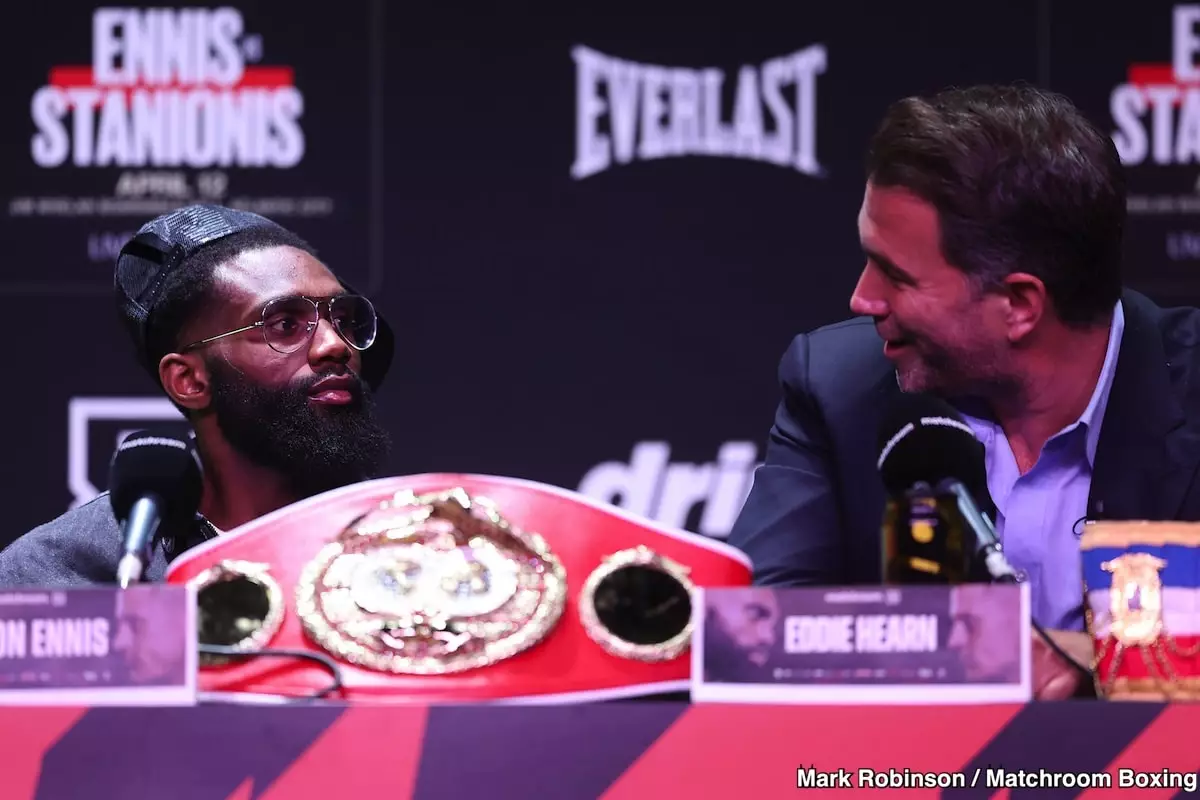In the frying pan of professional boxing, where fights can make or break careers overnight, few stories are as charged as that of Jaron ‘Boots’ Ennis. Recently, boxing fans have taken to social media to point fingers at Ennis for allegedly avoiding a high-stakes match against fellow welterweight sensation Vergil Ortiz Jr. Instead, Ennis opted for a less financially rewarding bout against Eimantas Stanionis. Critics claim this decision reeks of “ducking,” a term synonymous with cowardice in the boxing lexicon. Yet, a deeper examination reveals more nuance in Ennis’s choices and the dynamics influencing his career.
Facing the Backlash: Ennis’ Claims
In his defense, the IBF welterweight champion Ennis asserts that the discourse around his decision stems from “miscommunication.” He argues that fans and analysts do not possess the full picture, as details often lie behind closed doors. His promoter, Eddie Hearn, has confirmed that Ennis is committed to staying at the welterweight division instead of challenging Ortiz at 154 pounds. This declaration, however, is interpreted by many as an aversion to facing Ortiz, who appears to be on a warpath for dominance in the ring.
While on the surface, Ennis’s decision seems pragmatic, prioritizing title retention over a potentially risky fight, his situation becomes significantly more complex when one considers the voices of the fans. They see a fighter ducking a formidable opponent in favor of a safer option. To the average observer, this smacks of an unwillingness to engage with the elite of the sport.
The Perception of Ducking: A Destructive Label
The term “ducking” carries with it tremendous weight in boxing. It is a permanent blemish, a stain on a fighter’s resume that can overshadow achievements. As Chris Mannix inquired about the criticism directed at Ennis, he revealed a pivotal aspect of public perception: fighters live and die by their reputations. Being labeled a “ducker” can severely impact a fighter’s market value and standing within their division. It is not merely a matter of ego; it directly correlates with future opportunities and financial gain.
There is an irony in how the sport’s nomenclature operates: ducking often implies an avoidance of confrontation for financial prudence, yet the same critics often fail to acknowledge the seriousness of navigating through the complex ecosystem of boxing negotiations, sponsorships, and promotional dynamics. Thus, labeling Ennis as a “ducker” could be more a reflection of societal impatience than of his actual intent or capabilities as a fighter.
The Fan Factor: Misguided Fidelity to Fighters
Perhaps the most disheartening aspect of this entire debacle is the opportunistic nature of some fans who jump at any chance to vilify a fighter. Social media platforms have given rise to influencers—podcasters and YouTubers—whose commentary can influence public sentiment. Ennis pointed out the egregiousness of uninformed speculation; many analysts distill narratives that are hefty on drama yet devoid of context. The echo chambers of online communities amplify this criticism, demanding instant gratification in the form of high-stakes fights, often at the expense of comprehensive understanding.
While fans are entitled to their opinions, their narratives can create toxic environments around fighters, overshadowing the intricate realities of the sport. Ennis’s reaction—that “nobody be ducking” and that critics lack nuance—challenges the vocal dissatisfaction surrounding his choices, urging fans to engage critically rather than react emotionally.
Looking Ahead: Ennis’ Focus on the Present
Despite the turbulence enveloping Ennis, it’s crucial to note his focus on the future. Undeterred by the storms of public criticism, he remains committed to his upcoming match against Stanionis. In this regard, Ennis exemplifies a promising trait—the ability to prioritize growth and skill development over fleeting opinions. The boxing world is inherently tough and only through dedication, hard work, and strategic planning can a fighter ascend the ranks to greatness.
As Ennis continues to navigate his way through the heated welterweight division, one can only hope the conversation shifts from wild accusations towards more constructive discourse about the fighter’s journey and his potential impact on the sport. It’s in this spirit of growth and resilience that Deontay Wilder, Canelo Alvarez, and others have forged their legacies, and it is where Ennis has the opportunity to carve out his own. Only time will tell whether he rises or falls amid the tumult of expectations.


Leave a Reply